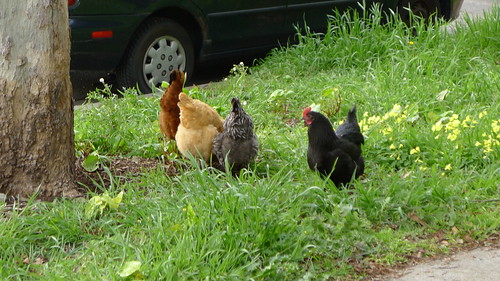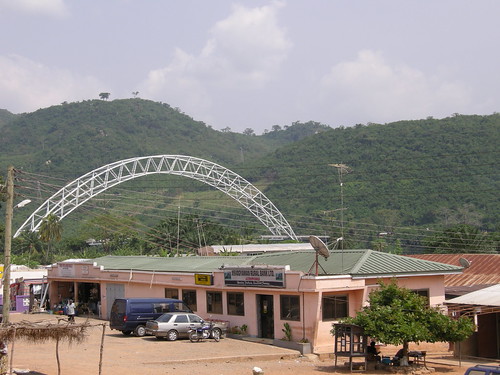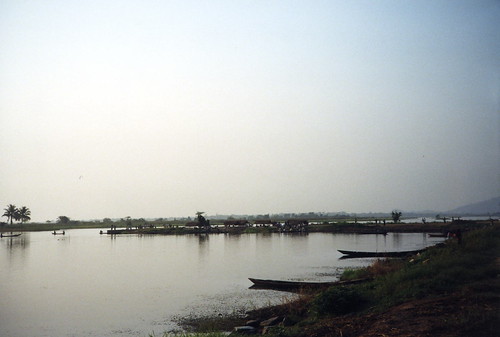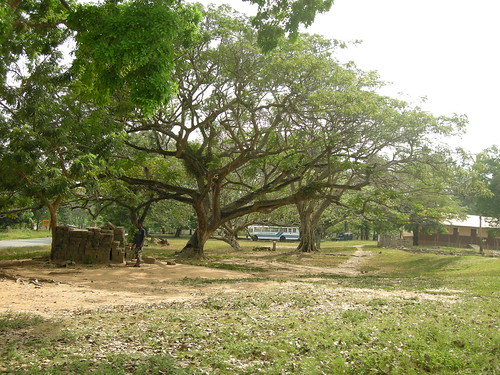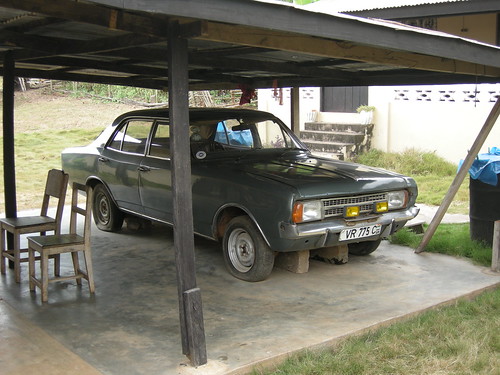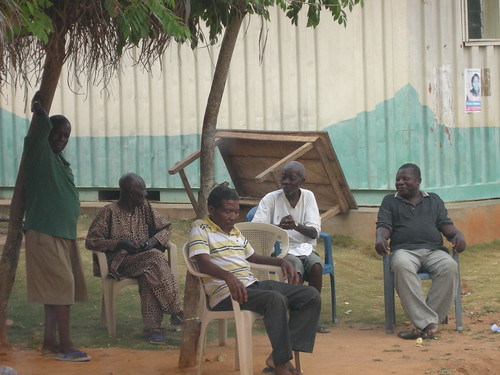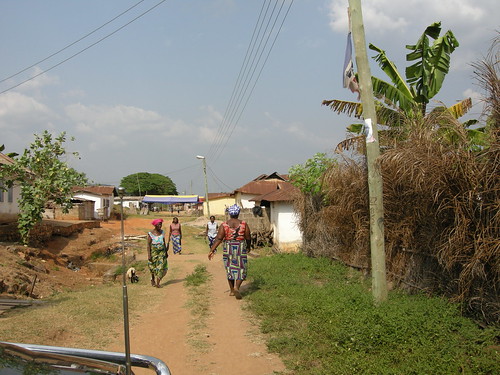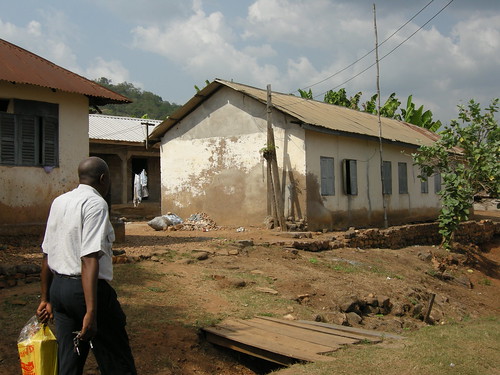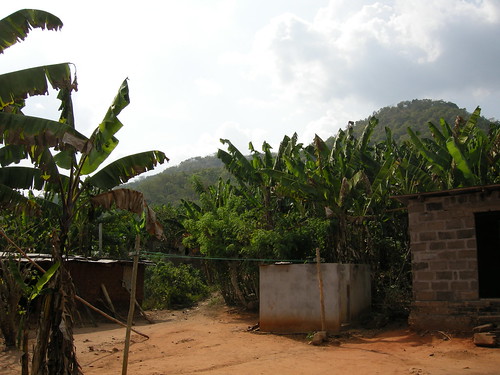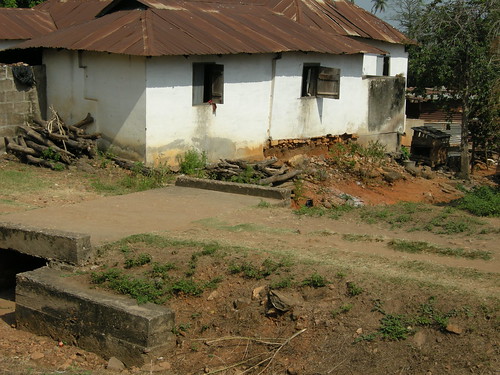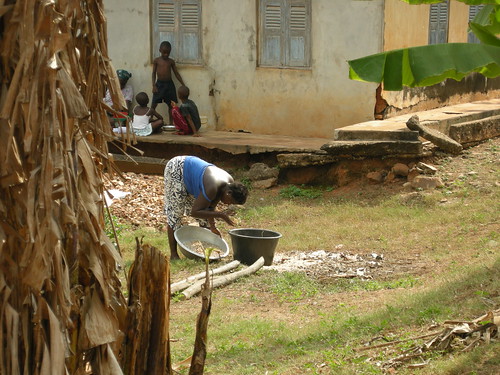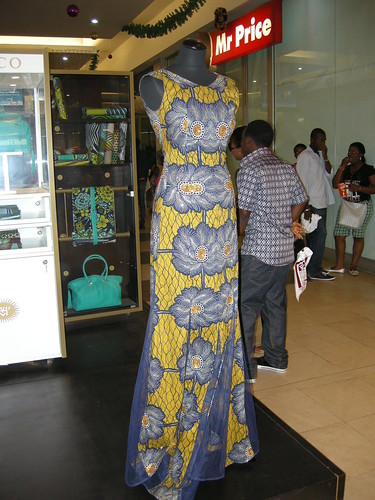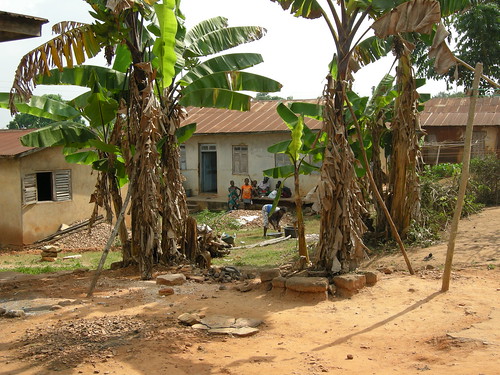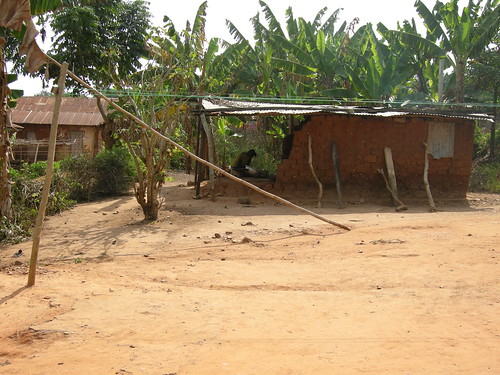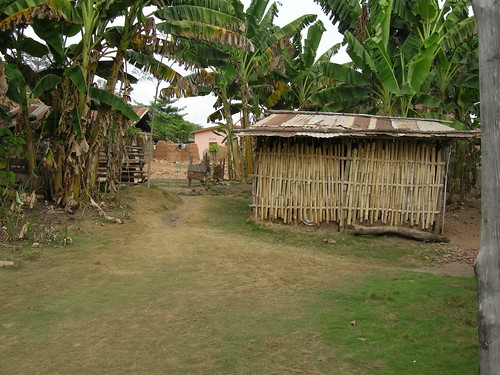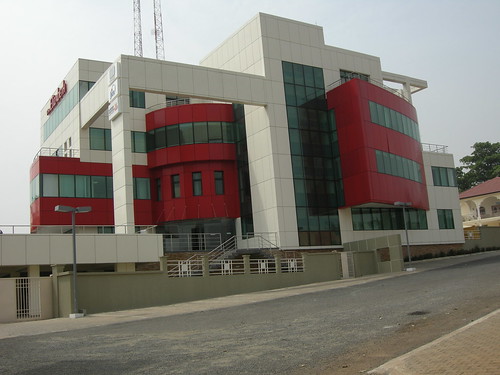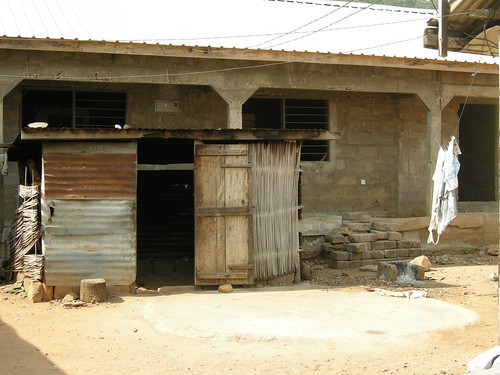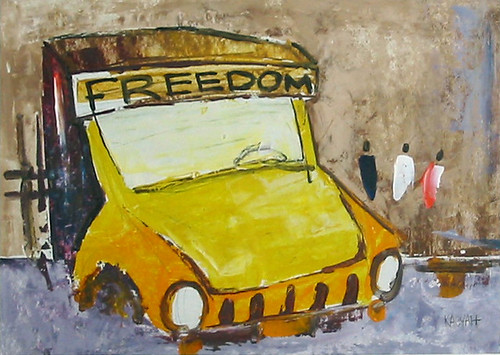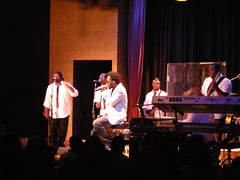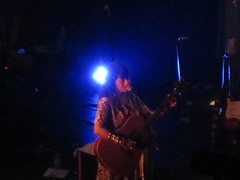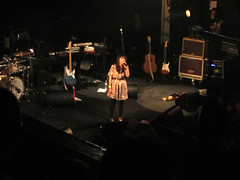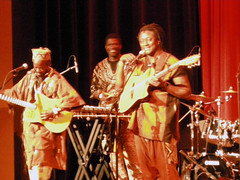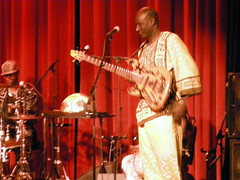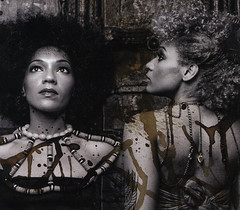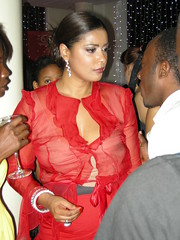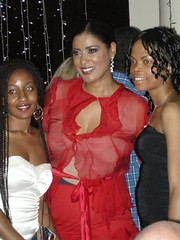Road Trip
It was a mere road trip to fetch my grandmother from our family's village in the Volta region for the New Year, yet it ran the gamut of emotions. Some impressionistic travel toli from the archives...
I. Sick
The motorcyclist didn't even try to avoid them - indeed it seemed as if he sped up to reach them. Coming up behind him, and taking furious evasive action, we barely missed adding to the desolating impact. A contest between a Honda motorbike and a hen and her four chicks will always be unequal. A week-old chick, half the size of a tennis ball was the fatal casualty, collateral damage to glib insouciance. The reaction to the death was all too familiar. The hen felt the maternal loss - there was that squealing sound, and the mortified look at the crumpled flesh was a recognizable universal. Yet there was no time to dwell on the damage and she gathered the remainder of her brood to continue crossing the road - presumably she would return later if at all possible, braving the traffic. We all felt sick in the car; we all felt angry. What kind of man enjoys running over a chick? As we overtook him, the wrathful thought crossed my mind, a slight swerve and it would be the same kind of competition between our four-wheel drive and his motorbike, roadkill revenge on this chick murderer on the main street in Anyiwarase. Such are the conflicted musings of a backseat driver... Instead, we mournfully averted our eyes as we passed: they say that, much like revenge, wrath is for the weak. In any case, the next town was coming up.
II. Sour
The mood in the car turned eerily reflective as we drove through the village of D. It took me half a minute to remember that its townsfolk had attempted to murder my uncle in the last elections, which explained the pregnant silence of his brother, who slowly drove the car through its only paved street - he'd had to retrieve him back then, bloodied and all, and the stillness of his 89 year old mother, who is still feeling the wound to this day. Try as I might, and I tried twenty times in a row, no pictures that I took would come out right. It was as if the Gods of Nikon decided to forbid me a photographic record of this hamlet of trauma. Oh well, it would have to live on in my memory, live and not Memorex.
We noted that the electricity that my mother had sought to have delivered to the village had indeed been installed, and that the school now seemed well appointed and equipped and even had a fresh coat of paint. It was their just reward, a shower of love. The village is a religious settlement, home to an evangelical sect; the unkind call them a cult, but surely brands do not matter in Ghana's new Christianity. "Welcome to D. City of God. A holy town", proclaims the sign at the village entrance. "One whose folk do unholy things", I thought to myself...
Nothing was said for a long while in that car; call it group therapy for three generations. A commemoration of a town we must pass whenever we want to see loved ones.
To salve myself, I remembered a lyric, nothing hits your heart like soul music, and contemplated a playlist - the lead track would have to be Portishead's Sour Times. My thoughts then turned to the climax of that Clint Eastwood b-movie, you know, the one in which the avenging gunfighter makes the all-too-fallible members of a town paint it entirely in red as if to commemorate the blood that spilled on the ground. Oh, and in that vein perhaps Gil Scott-Heron's Paint it Black, would fit the bill. And so forth... There was perfect silence until we reached the bridge.
III. Sweet
We stopped after we crossed the bridge at Atimpoku. As we slowed, thirty-five or more traders, mostly young girls, scampered in our wake and surrounded the car, arms outstretched, wares on the head, and tongues wagging. Some insistent, some seductive, some combative, the whole, a joyful cacophony.
They shouted, "Papa-le, Novi, Big Man. Hey. Honey. Over here..." Rolling down the window, I could see and smell the alluring prizes they presented: abolo and the red lobster, shrimp and crayfish - freshly caught and smoked from the river. And the pears of course. Indeed some shoved their wares into the car. Well the bargaining began in earnest. In Africa, a market forms wherever there is slowed traffic; one's car window becomes a temporary shop, the products thrust in your hands for brief evaluation. You have to bargain hard even though the prices are ridiculously low from your dollar-based standpoint. It is expected that even big men will barter; as they say, markets are conversations.
Stopping at the bridge to buy abolo and shrimp was a ritual my uncle and I have always performed. I remember especially vividly the roadtrips the two of us took in the late 80s and early 1990s. Back then, with the poorer roads and cars, we were guaranteed to break down and the food would prove essential as we waited at the roadside for someone to stop and help. As the bundles of food produce were handed over, the thought vaguely crossed the mind that most of these girls should be in school rather than hawking their wares. The warm, breadlike abolo — baked rice flour wrapped in fresh plantain leaves, smelled and tasted as I remembered: at once sour and sweet. And the shrimp! Well... There's a reason we always ate them even during the cholera scares of a decade ago... Ah foolish me, forgive me for thinking that cholera scares were a thing of the past, apparently they're back these days.
Of course the packaging of the food wares on hand recalled the eternal tension between tradition and modernity. On the one hand, the organic plantain leaves that no one can imagine buying abolo without, and, on the other, the now-ubiquitous plastic bag or cling wrap surrounding the shrimp. Or indeed consider the sachet water industry that the young girls, the kayaye, that ply our streets embody. You can't avoid plastics it seems; the populace has seeming voted with its pocket books for sachet drinking water and the cottage industry it has spawned. We really must challenge ourselves to do better when it comes to packaging of our foods. The market hasn't changed in over a century except perhaps with this non-biodegradable detritus that mark out our modern age.
Newly repaired and resurfaced, the bridge looked better than I'd ever seen it. Deferred maintenance is the usual fare in our lands but some enterprising soul had managed to secure the funds to rehabilitate this bridge, allowing it to escape the lot of the numerous road and construction projects that have simply stalled in the past few years - even as they had been budgeted for. My uncle regaled me with the toli that the drivers of some of the very heavily loaded trucks that we saw parked nearby in the town, which are ostensibly forbidden from using said bridge, were known to lie in wait and pay lucrative bribes to pass during the night. Everyone knows it but no one does anything about it. Plus ça change, a routine story of law and disorder in Ghana.
The mood lifted as I took in the sights, sounds and smells of life around the river Volta. I remembered the great, restful feeling of earlier in the day. There's a reason everyone who visits loves this part of Ghana.
There's a certain freshness of the air once you cross the bridge and officially enter the Volta region. It's not that development has passed the place by but it does feel more unchanged. The nearby Ho hospital after all is testament to state-of-the art living (even if we discount its notorious 150 percent overhead - white elephant election gifts that World Bank directors would prefer you not to bring up in conversation). I recalled the majesty of the trees in our village commons, near the EP church (Evangelical Presbyterian that is). The trees that used to serve as facilities for the primary school all the way until 2002.
I remembered the sight of my grand aunt standing in line to vote in the day's district assembly elections, proud of doing her civic duty even amidst the shambles - the ballots had only arrived at 2 pm, and only in our village, not in the three surrounding villages. Her early-bird attempt at 9 am had been fruitless but hopefully by now she would have managed to cast her vote. Listening to her complain about the Electoral Commission and disorganization. I reminded her that she was the one who always said that democracy was a process, that we always had to fight for it. "Well it's getting tiring".
I was minded of the uncanny places you might come across a 1969 Opel, a vintage collector's item that deserves to be in a museum if not on the road.
I wondered about the lives of those who decide to retire to Ghana's villages. The old men sitting under the canopies throughout the day. Do they have places to go and people to talk to? Elder care ought to be a growth industry in Ghana, and professionalized too. Those traditional bonds that we have long prided ourselves as differentiators are a thing of the past.
But it was all about talking to family, young and old, and hearing about the changes we'd been going through.
Our village is always restful.
The once dense forest in the Abutia hills is slowly recovering from the depredations of the nearby human settlements.
Our houses are mostly unchanged.
We work with millet and maize in the same immemorial manner as if a little technology couldn't help.
Heading back home we reached the Tetteh-Quarshie roundabout, named after our country's famous scion (he brought cocoa, that other black gold to Ghana). Formerly miles of unused land, and notoriously the dumping ground for some of the laziest of Rawlings's deathsquads in the early eighties (the Affram plains being too far for their cargo of bodies), it has seen development - they now call it an interchange. On its margins still sits the unfinished hotel that the owner of Shangri La started against advice until the marshy soil sank the buildings as if in rebuke. But there are now additions and, well, the sour memories are being eclipsed by the new additions to its environs, the new sweetness of Better Ghana.
We passed the Accra Mall that, much like Citizen Kofi's, is an attempt to bring an upscale Southern California aesthetic to Ghana. The middle class of a recently declared middle income country deserve their Apple i-shop and finery. Vlisco proudly display their new creations and Woodin had just opened a branch doling out their fabulous fabrics. A store manager would later admit that too many people were window shopping over the holidays. And so we have the mall as a youth hangout, thoroughly normalized in other words. In just a few years, we have developed a mallrat culture worthy of New Jersey. Globalization as the Mosquito Principle.
We are living multiple realities it seems.
We passed the Villagio sky scrapers under construction that expats are buying sight unseen - rumours of up to a million dollars for the upper floors. The bit about these being all-cash payments makes one wonder about where the money is coming from.
Some things are unchanged, mud huts compete with steelworks.
Just a few minutes later we passed the gleaming office building that my cousin's husband designed just a few doors down our street. The quite malicious toli is that it was a monument to Mum, that she was behind it, that it was proof of her millions. It's the name you see, The Elizabeth. If only they could see her bank account and what fleeing your home at your prime into 18 years of exile can do.
Shacks overlap with shinging glass.
Life is sweet in Ghana (for some at least).
We came home that's all.
Soundtrack for this Note
A playlist for this road trip as is my custom
- The Beatles - Day Tripper
- Portishead - Sour Times
- Gil Scott-Heron - Paint It Black
- Mica Paris - Nothing Hits Your Heart Like Soul Music
- Cherrelle - Everything I Miss At Home (ft. Alexander O'Neal)
- Agona Swedru Youth Brass Band in performance
